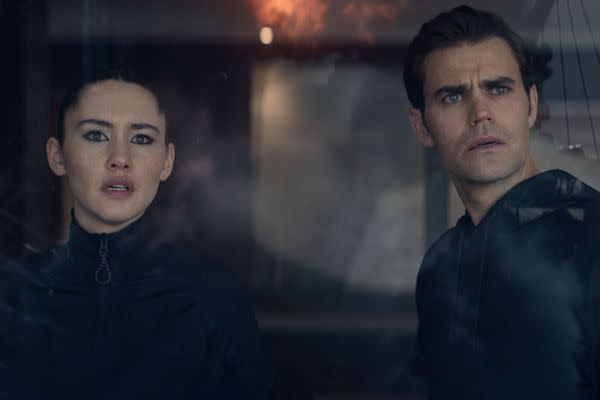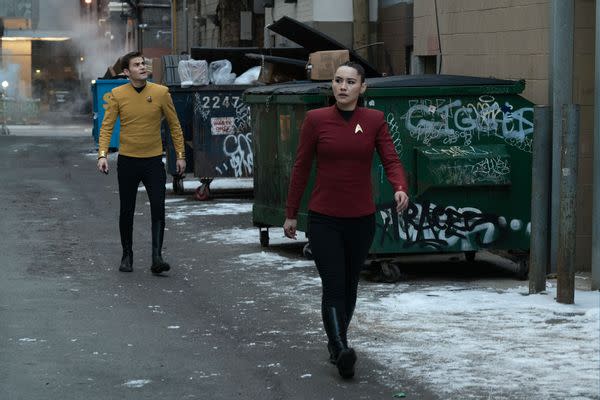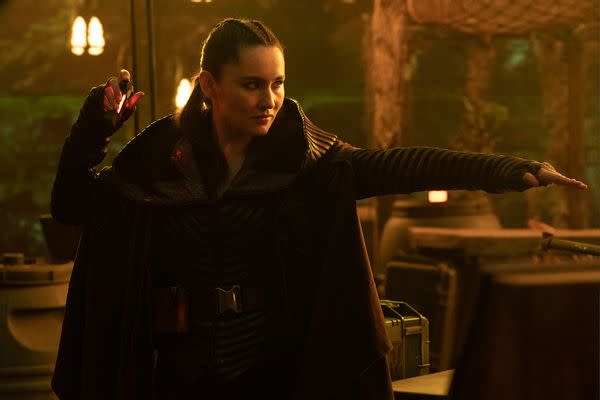"Star Trek: Strange New Worlds" considers the weight of Khan's wrathful legacy

- Oops!Something went wrong.Please try again later.
- Oops!Something went wrong.Please try again later.
Spoiler alert: This article discusses specific plot details within the "Star Trek: Strange New Worlds" second season episode titled "Tomorrow and Tomorrow and Tomorrow."
The latest episode of "Strange New Worlds" beams us to Toronto, Canada, 21st-century edition, where La'an Noonien-Singh (Christina Chong) and Captain James T. Kirk (Paul Wesley) must stop an event that will irrevocably alter the course of time. Since aspects of "Tomorrow and Tomorrow and Tomorrow" invite us to consider the lasting impact of historic reputations, let's take a short real-world trek to Long Island – home to the remaining known descendants of Adolph Hitler.
A reporter from the German tabloid Bild tracked them down in 2018 to obtain their views on politics. Only one spoke to him, revealing he liked Angela Merkel and was not a fan of America's president at that time.
All of them changed their last names, and their neighbors had little to report about them save for their niceness. The rest of the article describes what seems to be a low-grade nerve-wracking life if not a lonely one.
This trivia tidbit would not have organically come to mind while watching the latest episode if we didn't contemplate La'an's lot as the descendant of Khan Noonien-Singh, a tyrant who lorded over a quarter of the planet during the 1990s . . . according to the original "Star Trek."

Christina Chong as La'an and Paul Wesley as Kirk in "Star Trek: Strange New Worlds" (Paramount+)
"Tomorrow and Tomorrow and Tomorrow," written by David Reed and directed by Amanda Row, adjusts that history to explain how La'an and Kirk end up encountering a certain version of her past in a decade that doesn't line up with franchise history. This vital detail drops near the end of the episode, all of which takes place in another timeline. The Kirk who joins La'an's escapade to the past has never heard of the Federation of Planets. Since Earth had been rendered uninhabitable in his time, he was born in space – on the U.S.S. Iowa, not the state of Iowa.
Even more shocking to La'an is that he doesn't recognize her surname.
When that dawns on La'an, her brooding countenance relaxes only for a second or two. Her visible relief grants us a sense of what it means to carry a cruel legacy in one's name. Khan has nothing to do with who she is, yet she has spent her life answering for his crimes against humanity.
Related
How "Star Trek: Strange New Worlds" uses Rebecca Romijn's Number One to place prejudice on trial
"Strange New Worlds" directly converses with one of the "Star Trek" franchise's darkest villains through this character, especially in a second season that has used two of its three opening episodes to grapple with the lasting impact of the Eugenics Wars.
The massive destruction and tens of millions of deaths caused by these conflicts led the United Federation of Planets to declare genetic alteration or modification to be illegal. This had the unintended effect of outlawing an entire people, the Illyrians.
Khan is a warning against pursuing supremacy instead of strengthening diversity to make life better for everyone.
But it also leaves La'an in an existential limbo since her genetic augmentations are inherited. Her knowledge of Khan comes from her education, much in the same way we have absorbed the history of World War II. That didn't prevent her from being bullied and ostracized before she joined Starfleet.
The "Trek" audience knows more than she does, which lends her story an element of mystery and potential that other legacy characters don't have. We know where Captain Christopher Pike (Anson Mount), Spock (Ethan Peck) and Kirk are destined to land since "Strange New Worlds" is set before the first "Star Trek" and its voyages.
This also means the events of "Space Seed," the 1967 episode where Khan is introduced, have yet to take place.

Christina Chong as La'an and Paul Wesley as Kirk in "Star Trek: Strange New Worlds" (Michael Gibson/Paramount+)
Khan, originally played by Ricardo Montalbán, is charismatic, highly intelligent and manipulative, the "best" of the superhuman dictators who nearly destroyed the planet. Khan and his fellow superhumans were created by scientists trying to create a generation of beings who would steer humanity into an era of peace.
By the time William Shatner's Kirk and the Enterprise crew encounter Khan and 84 of his fellow Augments, who spent centuries in suspended animation aboard the U.S.S. Botany Bay, they already know what he and his kind have wrought. Those scientists didn't account for what eventually turned out to be a fatal flaw. "Superior ability breeds superior ambition," as Leonard Nimoy's Spock put it.
To Spock's horror Kirk, Bones, and Scotty speak of Khan in admiring terms. But it is one thing to consider such men from the perspective of hundreds of years after their time and another to have one in your midst. Khan seduces Enterprise's strongman-obsessed historian, Lieutenant Marla McGivers (Madlyn Rhue), who aids him and his compatriots to seize control of the starship. Kirk and Spock retake the ship before Khan can do any more damage, aided by a remorseful McGivers. Instead of imprisoning her, Khan, and the other Augments, he exiles them to live out their days on the technology-free planet Ceti Alpha V.
Kirk comes to regret that decision when Khan returns in 1982's "Star Trek II: The Wrath of Khan" to take revenge on the Enterprise captain for marooning them on a planet that McGivers, who became Khan's wife, did not survive.
I've often wondered whether Khan would have cast such a long shadow over "Star Trek" if Montalbán weren't starring in "Fantasy Island" when "The Wrath of Khan" was made. Its producers worked mainly in TV, and its director had never watched an episode of "Star Trek" before joining the project. Maybe this lack of preciousness concerning what Trek is supposed to be is why the second motion picture turned out of to be the best of the original franchise's feature films.
According to lore its producer Harve Bennett plucked Khan out of the series because he gave the story what he believed that the first movie lacked, which was a singularly motivated villain. "Wrath of Khan" revolved around a vendetta, a more reliable attractor for moviegoers than a story about a speculative concept. J.J. Abrams leaned into this a bit harder with Benedict Cumberbatch's interpretation of the Kelvin timeline's version of the character, which made him a Section 31 agent gone rogue in 2013's "Star Trek Into Darkness."
That Khan is a living representation of scientific hubris and man's obsession with perfection probably mattered less than the fact that fans knew Khan how to make Kirk bleed.
But Khan's origin story and what it represents keeps his name alive, sadly. Moving beyond the timing Gene Roddenberry predicted for humanity doesn't mean we've escaped its pitfalls. Khan and the other Augments were grown using genetic material from many cultures; he was described as Sikh. That merely meant race didn't factor into how he discriminated against others — his determination of superiority resembles Darwinism. Only those who submit to him or surpass him are worthy of his respect. That thinking doesn't fly with the Federation.

Christina Chong as La'an appearing in "Star Trek: Strange New Worlds" (Michael Gibson/Paramount+)
A main character in "Star Trek: Prodigy," Dal R'El, only finds out he's an Augment well into adulthood, but that still places his status at risk. Commander Una Chin-Riley (Rebecca Romijn), an Illyrian, had to hide her true cultural identity from the Federation and Starfleet due to no actions of her own. Her career record was spotless. Because of Khan, Una had to defend her right to follow a career path for which she was amply qualified and that she loved.
Khan's origin story and what it represents keeps his name alive.
In "Star Trek: Deep Space Nine" we find out that the parents of Dr. Julian Bashir (Alexander Siddig) had his DNA entirely re-sequenced when he was a child to eliminate a severe learning disability. When the Federation finds out, his father pleads guilty so that Bashir can remain in Starfleet and retain his medical license, with the Judge Advocate General asserting that for every individual like him who benevolently employs his enhancements for the greater good, "there's a Khan Singh waiting in the wings."
La'an confronts a weightier choice in "Tomorrow and Tomorrow and Tomorrow" when a Romulan assassin hiding out on Earth offers her a chance to live out her days anonymously in this timeline by allowing her to murder the child version of Khan. It's something the operative explains was supposed to happen years ago – at least since 1992, she says, when the wars were originally supposed to occur. Instead, the spy claims a different victory by fatally shooting this universe's Kirk.
Want a daily wrap-up of all the news and commentary Salon has to offer? Subscribe to our morning newsletter, Crash Course.
La'an neutralizes her ancestor's would-be killer instead, coming face-to-face with him as a frightened child. She comforts him briefly before returning to the Federation timeline we know, where a temporal agent from the future retrieves the device that sent her to the past and orders her not to tell anyone what happened. It's a happy ending, but only in part. The main timeline's Kirk is alive but doesn't remember her.
Heavier than this is her knowledge that she allowed a boy to live that she knew would grow into a man who would go on to murder and subjugate untold numbers of people, and knowing that if he were erased from the universe, humanity would fail to learn the lesson taught by his darkness.
"Tomorrow and Tomorrow and Tomorrow" is a traditional "Trek" alternate universe adventure where key characters are pushed through the looking glass to right something gone wrong on a cosmic scale. It also smooths out significant canonical wrinkles via retcon, which more devoted Trek observers than I have explained in detail.
Aside from that, this "Strange New Worlds" speaks to Khan's legacy by making a historically heavy conundrum painfully personal. Khan is a warning against pursuing supremacy instead of strengthening diversity to make life better for everyone. La'an's burden, in this episode and the series overall, is to figure out what it means to carry that red flag in her genes.
In the previous episode, an Illyrian assures La'an that her inherited augmentations make her no more dangerous than anyone else, and that she holds the same capacity for actions, good or ill. The events of "Tomorrow and Tomorrow and Tomorrow" allow her to exercise that capacity, saving millions and a brighter future in the process. Keeping the cost of her choice a secret places a weight on her shoulders she didn't ask for, separate from the weight of her name and because of it.
New episodes of "Star Trek: Strange New Worlds" debut Thursdays on Paramount +.
Read more
about "Star Trek"

